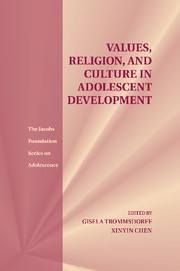Book contents
- Values, Religion, and Culture in Adolescent Development
- Series page
- Values, Religion, and Culture in Adolescent Development
- Copyright page
- Dedication
- Contents
- Contributors
- Preface
- Acknowledgments
- Part One Theoretical Perspectives on Values, Religion, and Adolescent Development in Cultural Context
- Part Two Universal and Culture-specific Functions of Adolescent Values and Religion
- Part Three Impact of Values and Religion on Adolescent Adjustment in Times of Social Change
- 9 Marginalized Japanese Youth in Post-industrial Japan
- 10 Adolescent Cultural Values and Adjustment in the Changing Chinese Society
- 11 With God’s Help
- 12 Religion’s Role in the Development of Girls’ Occupational Aspirations
- 13 First Romantic Relationships of Adolescents from Different Religious Groups in Israel and Germany
- Part Four Socialization Processes of Values and Religion in Adolescent Development
- Index
10 - Adolescent Cultural Values and Adjustment in the Changing Chinese Society
from Part Three - Impact of Values and Religion on Adolescent Adjustment in Times of Social Change
Published online by Cambridge University Press: 05 September 2012
- Values, Religion, and Culture in Adolescent Development
- Series page
- Values, Religion, and Culture in Adolescent Development
- Copyright page
- Dedication
- Contents
- Contributors
- Preface
- Acknowledgments
- Part One Theoretical Perspectives on Values, Religion, and Adolescent Development in Cultural Context
- Part Two Universal and Culture-specific Functions of Adolescent Values and Religion
- Part Three Impact of Values and Religion on Adolescent Adjustment in Times of Social Change
- 9 Marginalized Japanese Youth in Post-industrial Japan
- 10 Adolescent Cultural Values and Adjustment in the Changing Chinese Society
- 11 With God’s Help
- 12 Religion’s Role in the Development of Girls’ Occupational Aspirations
- 13 First Romantic Relationships of Adolescents from Different Religious Groups in Israel and Germany
- Part Four Socialization Processes of Values and Religion in Adolescent Development
- Index
Summary
Over the past two decades, China has been changing dramatically toward a market-oriented society, particularly in urban areas, which may undermine the traditional cultural and religious systems. Individualistic ideologies and values are required for adjustment and success in the new competitive environment and are increasingly appreciated by individuals, especially in the young generations. This chapter focuses on cultural values and their relations with adjustment in Chinese youth from urban, rural, and rural-to-urban migrant backgrounds. There is emerging evidence suggesting differences between the urban and rural adolescents in their cultural values. Whereas group orientation and social connectedness continue to be valued among rural and urban adolescents, urban adolescents are more likely than their rural counterparts to appreciate and approve the expression of personal distinctiveness and develop a “unitary and stable” self that is separate from social context. Moreover, among urban, but not rural or migrant, adolescents, values of uniqueness have become important for the development of social status in the peer group and school achievement. As a future direction, it will be interesting to explore how adolescents in China integrate diverse values in their adaptation to the changing sociocultural context.
- Type
- Chapter
- Information
- Values, Religion, and Culture in Adolescent Development , pp. 235 - 252Publisher: Cambridge University PressPrint publication year: 2012
- 18
- Cited by



